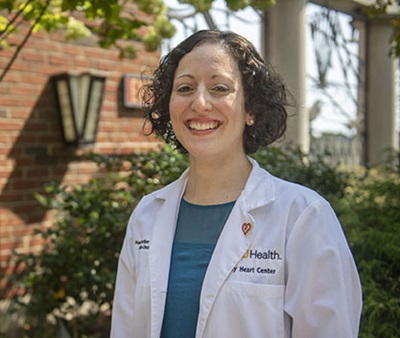
Faculty spotlight: Wendy Bottinor, M.D.
A cardio-oncologist, she helps minimize cardiovascular problems during and after cancer treatment

Cancer and its treatment appear to exacerbate heart disease in cancer patients. Pauley Heart Center and VCU Massey Cancer Center are working together to address the problem through a new cardio-oncology program that includes cardio-oncologist Wendy Bottinor, M.D., who joined the Pauley faculty in 2020. In her role, Bottinor ensures a patient’s heart is healthy for cancer treatment and helps minimize cardiovascular problems both during and after cancer care.
You earned your M.D. at VCU Medical School and did your residency here. After being away for several years, what drew you back?
What drew me back was Greg Hundley, M.D., the Pauley Heart Center and my really strong belief in the incredibly robust cardio-oncology program that we are establishing, both clinically and in the research arena. To be able to come back to an institution that provides excellent clinical care and is developing a unique and strong research program as well — naturally, I am proud of that.
What makes VCU Health’s cardio-oncology program stand out?
Our program has a highly collaborative and multidisciplinary approach that you do not find in many places, even other academic centers. For example, our team includes experts in cardio-oncology, innovative cardiovascular imaging, biomedical engineering, exercise physiology, and nutrition and metabolism. We are a highly collaborative team and are all working together to understand the link between cancer and cardiovascular disease. We’re also one of a handful of institutions with the ability to perform high-level physiological exercise testing and pair this with state-of-the-art cardiovascular magnetic resonance imaging. This is important because when we’re thinking about individuals with cancer, or survivors, and how we can promote cardiovascular health, exercise limitations are common.
What clinical trials at Pauley Heart Center are you most excited about?
We have several exciting trials here. One is the PALS study, led by Alexander Lucas, Ph.D., which is determining how physical activity during cancer treatment impacts outcomes. The study’s team members are testing whether participating in physical activity classes or educational classes will help lymphoma or breast cancer patients preserve their exercise capability, heart function, brain-based activities (like memory) and quality of life during their treatment. Another study currently enrolling is the CASTOR-2 study, which is working to identify how thoracic radiotherapy for lung cancer impacts the heart. As for me, I am working to start a clinical trial using novel, innovative cardiac magnetic resonance imaging techniques to identify factors that contribute to the development of heart failure among survivors of cancer diagnosed in childhood, adolescence or young adulthood. As part of this study, I am also hoping to trial a medical intervention.
Describe your research interests.
I’m really interested in understanding factors that contribute to cardiovascular disease among survivors and how we can improve cardiovascular health. For example, we are starting to understand that hypertension significantly increases the risk for heart disease among survivors. Another layer of complexity to this is, in general, people of African American ancestry are at risk for developing hypertension at a younger age when compared with their Caucasian counterparts. African Americans may also develop more severe hypertension and require more medications for blood pressure control. There are many questions to be answered in cardio-oncology and a lot that needs to be done to improve our understanding of the underlying processes leading to these disparities.
When should cancer patients see a cardiologist?
If a patient has a history of heart disease or medical issues that put them at higher risk of cardiovascular disease, we will often meet before they start cancer therapy to make sure their cardiovascular health is as optimal as possible. We will also follow them during therapy and into survivorship. Of course, there are also patients who are relatively healthy and lower risk for the development of cardiovascular issues. In this situation, we may not see the patient before they start cancer therapy, but we are always available if needed.
Back to Autumn 2021


